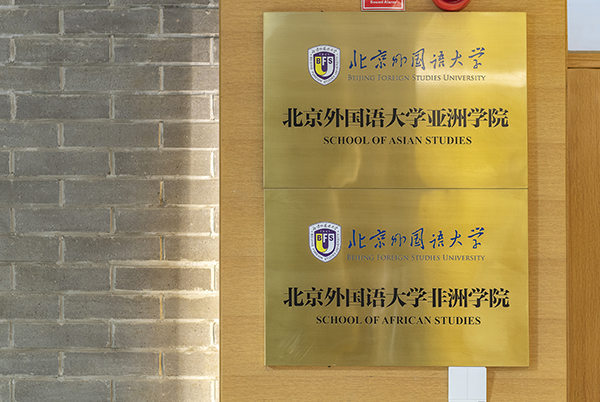- Research
- Research Centers
- Journals
- Admission
- Introduction
- Programs
- Application
- Alumni & Giving
- Alumni Club
- Giving

In 1961, under the visionary guidance of Premier Zhou Enlai, the Department of Asian and African Languages at Beijing Foreign Studies University was established.
In 2001, it was approved by the Ministry of Education as a national base for cultivating undergraduate talents in less commonly taught foreign languages. In 2007, the department was renamed the School of Asian and African Studies and was designated as a demonstration site for specialty majors by the Ministry of Education and Beijing's higher education institutions.
As a significant milestone, the School of Asian Studies was officially inaugurated in 2019, becoming one of the faculties with the largest number of Asian language majors and the longest history among Chinese foreign language institutions.
The school offers a total of 30 language majors, with eight of them being the only specialized programs nationwide. Fourteen majors, encompassing Korean, Malay, Sinhalese, Thai, Turkish, Persian, Cambodian, Lao, Burmese, Hindi, Vietnamese, Indonesian, Bengali and Sanskrit&Pali, are designated as national-level first-class undergraduate discipline construction sites. Additionally, majors such as Filipino, Mongolian, Nepali, Urdu, Hebrew and Armenian are designated as municipal-level discipline construction sites.
In 2014, the school was approved to establish the secondary discipline of Asian and African regional studies, and in 2015, a regional studies teaching and research department was set up.
The school houses research centers focusing on South Asia, Southeast Asia, China-Malaysia, Vietnam, Iran, Cambodia, Laos and India, which are recognized as national and regional research centers by the Ministry of Education.
Currently, the school has 75 Chinese teachers, with 45 percent being professors and associate professors and 80 percent holding doctoral degrees. It also annually employs more than 20 foreign experts for teaching in the long term.
The school actively engages itself in multi-level and comprehensive international cooperation and exchange, establishing collaborative relationships with over 20 renowned universities and academic institutions in Asia, Europe and the Americas.
Over the years, the school has broken away from the traditional development path of foreign language faculties, integrating language discipline construction with national development strategies, and talent cultivation with research on Asian regional issues.
It has continuously enhanced the overall level of discipline construction in less commonly taught Asian languages, nurturing a significant number of high-level, composite talents who are patriotic, have global perspectives and possess professional capabilities.
These talents, graduated from bachelor's, master's and doctoral programs, actively contribute to the work of national ministries, enterprises, universities, media and research institutes, playing a crucial role in fostering friendly exchanges between China and Asian countries.